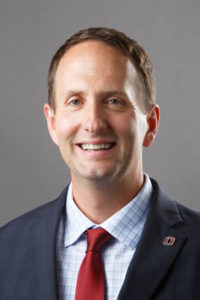A 2017 study published in the Journal of Psychiatric Services has raised alarming concerns about increasing levels of psychological distress among Americans.

Dr. Dan Shipp, vice chancellor for student success and UNO/UNMC
To combat this trend, leaders at the University of Nebraska Medical Center and the University of Nebraska Omaha are working together to reduce student stress and increase student resiliency.
Throughout the summer, leaders from the UNMC and UNO gathered to discuss student, faculty, and staff wellness.
“UNO and UNMC are collaborating in unprecedented ways and what better time to focus on shared resources and interests regarding student, employee, and faculty wellbeing,” said Cathy Pettid, assistant vice chancellor for student affairs at UNO. “Specifically, we have the opportunity to make UNO and UNMC the healthiest campuses in the nation with efforts focused on sleep, mental health, stress reduction, and resiliency.”
During the meetings, the leaders looked at current strengths and opportunities as well as weaknesses and threats.
Some of the weaknesses discussed included getting information to a large number of faculty, students hesitant about asking for help, and a lack of student classes for graduate students. Threats include budget concerns and multiple campuses needing to find time to communicate and to work together.
The good news is that current leadership at both institutions support wellness education and programs and there are wellness electives for students and stress management training for faculty and staff.
“It was an important step to bring key leaders together from both campuses (UNMC and UNO) to begin reviewing what wellness-based educational programs and support services are currently available to students, faculty, and staff. We were also able to dream a little and start thinking about what we need to put in place to ensure that all members of our communities learn to live well and thrive,” said Dr. Dan Shipp, vice chancellor for student success and UNO/UNMC.
“I believe we have a good working mission statement of ‘At UNO and UNMC, we will learn how to live well and thrive,’” Kaminski said. “That statement ties into the Chancellor’s remarks this morning at UNO’s Strategic planning session about preparing individuals to be the best they can be and be lifelong learners.”
Dr. Wengel said training in healthcare could be very stressful, and the anxiety is getting worse.
“We need to be there for our students and prepare them for when they will be practicing medicine,” said Wengel, assistant vice chancellor for wellness at UNMC/UNO.
Also attending the meetings are Rowen Zetterman, associate vice chancellor for academic affairs; Jonathon Sikorski, director of wellness education at UNMC; Charlene Patterson, director, counseling and psychological services at UNO; Jeanne Surface, associate professor, educational leadership at UNO; and Phil Covington, interim assistant vice chancellor of academic affairs/interim director of student success at UNMC, director of student conduct & community standards at UNO.
Along with meeting with leaders are UNO, Dr. Wengel, and Dr. Sikorski have also worked with students at the University of Nebraska Lincoln. In September, Dr. Wengel and Dr. Sikorski met with first-year veterinary students. According to a study published in the Canadian Veterinary Journal and the National Institute of Health, the rate of suicide in the veterinary profession has been pegged as close to twice that of the dental profession, more than twice that of the medical profession, and four times the rate in the general population.
Additionally, Dr. Wengel and Dr. Sikorski have met with groups all across the Omaha Metro to discuss wellness, stress management, and resiliency.
When asked why so many UNMC departments and local organizations have reached out to them for presentations, Dr. Sikorski said leaders are well aware that work stress has become a 24/7 problem.
“There’s a rising tide of stress,” Dr. Jonathon Sikorski said. “You can’t get away from it. Now with our phones, work’s always calling. You could be home at night and still have to deal with the pressures of work. Stress seems to be on the rise, and people are looking for ways to cope.”